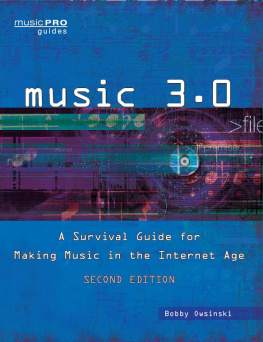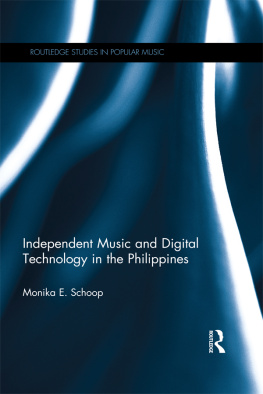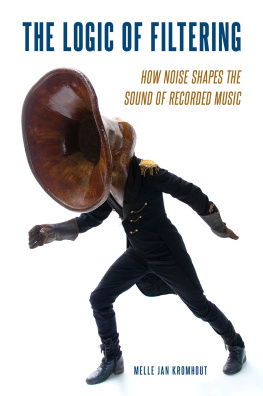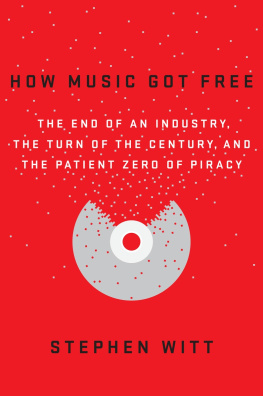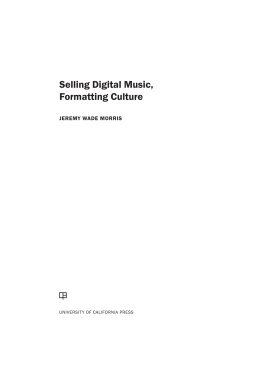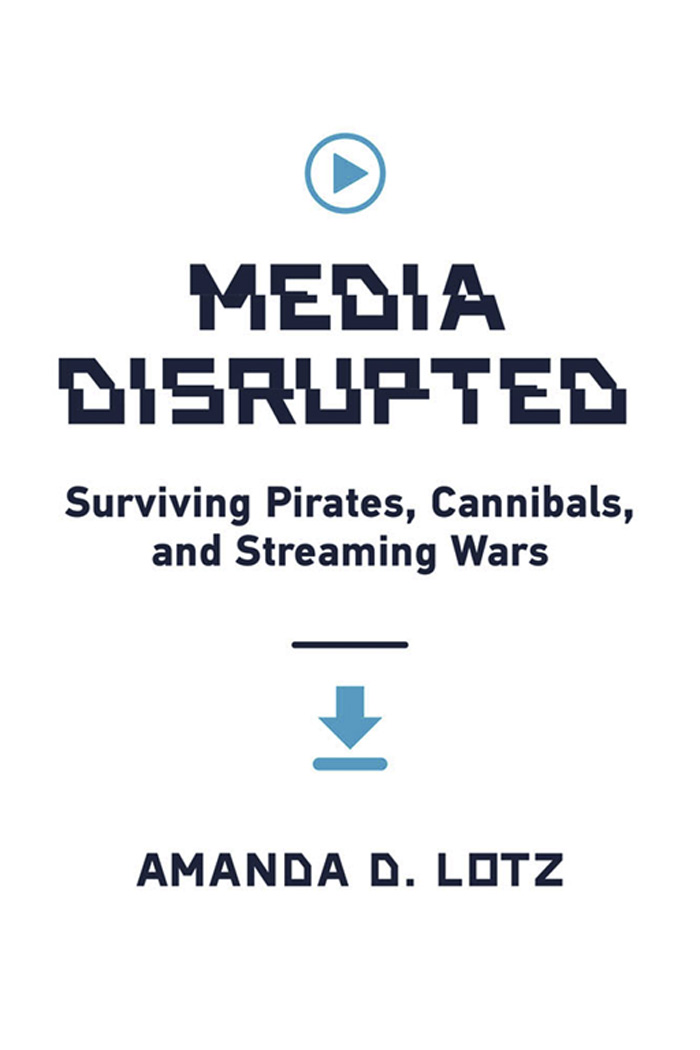
Media Disrupted
Media Disrupted
Surviving Pirates, Cannibals, and Streaming Wars
Amanda D. Lotz
The MIT Press
Cambridge, Massachusetts
London, England
2021 Massachusetts Institute of Technology
All rights reserved. No part of this book may be reproduced in any form by any electronic or mechanical means (including photocopying, recording, or information storage and retrieval) without permission in writing from the publisher.
The MIT Press would like to thank the anonymous peer reviewers who provided comments on drafts of this book. The generous work of academic experts is essential for establishing the authority and quality of our publications. We acknowledge with gratitude the contributions of these otherwise uncredited readers.
This book was set in Scala and ScalaSans by New Best-set Typesetters Ltd.
Library of Congress Cataloging-in-Publication Data
Names: Lotz, Amanda D., 1974 author.
Title: Media disrupted : surviving pirates, cannibals, and streaming wars pirates, cannibals, and streaming wars / Amanda D. Lotz.
Description: Cambridge, Massachusetts : The MIT Press, [2021] | Includes bibliographical references and index.
Identifiers: LCCN 2020050497 | ISBN 9780262046091 (hardcover)
Subjects: LCSH: Cultural industriesTechnological innovationsEconomic aspects. | Digital mediaEconomic aspects. | Disruptive technologies.
Classification: LCC HD9999.C9472 L68 2021 | DDC 384.3dc23
LC record available at https://lccn.loc.gov/2020050497
10987654321
d_r0
For Team Lotstutter, always.
Contents
with Lee Marshall
with Daniel Herbert
1
Digital Disruption
Multibillion-dollar businesses have been made and lost in the last two decades. Contrary to well-established ideas about barriers to entry, new players have launched into businesses decades and even centuries old, and they have not only survived, but thrived and have become market leaders. We vaguely recognize the shifts that made this possible as caused by the internet, tech, or digital, but most understandings of the reasons remain simple and crude. Whatever the causes, they enabled the creation of global companies such as Netflix and Spotify, while sounding the death knell for storied record label EMI and more newspapers and magazines than could fit on this page. The stories of these companies occupy the extremes. Hundreds of others have had their competitive playing fields radically altered, and they consequently endeavored upon extensive reorganization in an effort to continue to exist. These stories are often overlooked, although they are just as important.
Countless efforts to boil the transformations introduced by internet communication down to one-size-fits-all strategies and solutions have circulated in recent decadesstrategists claim companies must embrace the Long Tail, take advantage of network effects, or understand disruptive innovation. Many of these concepts appeared in the early throes of change and may not be wholly wrong, but they also are not the silver bullet for which those trying to steer businesses being turned on their heads were desperate. More nuanced explanations for this disruption are developing, but in many cases the root cause remains obscured by anxiety about uniform change wrought by the internet.
The dust has begun to settle, and this book examines the limits of those standardized strategies by looking closely at those that thrived and survived in order to understand why. The internet and the communication it enables have affected nearly all sectors of business. For some, they offered a new tool that was seamlessly incorporated into the functioning of incumbent companies. For example, what we once knew as cable companies, such as Comcast and Charter, transitioned into internet providers. Other industry sectors found their businesses cut off at the knees as the tools of internet communication made them inferior and unnecessary. This was the fate of video rental and a great deal of music retail.
A lot of what people think they know about how the internet affected media industries is wrong. Piracy didnt single-handedly decimate the recording industry, Netflix isnt killing Hollywood, and only freely given information can be free. These pithy sound bites are pervasive as conventional wisdom about how the internet and digital technologies have disrupted the media industries, but they are more myth than reality. Some of them may contain glimmers of truth, but, at best, they only hint at the first chapter of what happened.
This book examines four industries in a single sectormediathat experienced something closer to being leveled by internet communication than finding a new tool. Media industries such as recorded music, newspapers, film, and television were close to the ground zero of digital disruption. Their stories of business transformation are vital to the thousands employed in them globally, but they are also important to the much wider expanse of humanity that engages music, journalism, and video daily. What happened to these industries changed the media content they make and how we experience it, producing effects that will be felt for decades.
This book blends business history and analysis to explore how different industries within a common sector responded to seismic disruption. It answers the question of how the internet changed four media industries and what those experiences tell us about managing technological disruption. Although a single sector, among just these four industries, the stories are remarkably different.
Over the past two decades, a mythology about the implications of the internet has established itself as truth. In all four media industries, substantial fables and mistruths endure about what transpired and why. In many cases, the persistent belief in these myths handicaps decision makers who act in fear based on imprecise understanding of why internet communication challenged different businesses in different ways. These four media industries are distinctiveand their encounters with the internet reveal thisbut they also have underlying similarities that make their comparison a meaningful start to understanding broader change. The book begins the work of building specific histories of change by looking at multiple media industries and placing them in conversation.
The story first illustrates the misunderstandings about the nature of internet disruption that have obscured its core impacts. Rather than introducing new media or a new form of media to existing competition, as many expected, the internet turned out to be a newand often superiorway to distribute media to consumers. For much of the first decade of disruption, though, so-called digital media were perceived as a separate industry that would conquer those that predated the internet. Many initial responses consequently mistook the nature of the challenge that the internet and digital technologies posed. And even decades later, mistaking the nature of the problem continues to lead industry leaders to search for irrelevant solutions, regulators to establish the wrong policies, and consumers to misunderstand how and why the companies behind core technologies of everyday life have grown so powerful.
The Internet and Disruption
For two decades weve swum blindly through a tidal wave of change that weve vaguely understood as caused by the tech industry using the internet to disrupt the status quo. Its time we unpack what actually happened and where we are now.
The internet is an amazing, even awe-inspiring, communication technology. It introduced paradigmatic shifts in so many facets of life that it ranks with the engines that brought us the mechanization of the industrial revolution. Like the engine, the internet disrupted many industries, but claiming disruption is a facile explanation that offers little to go on. Arent we all always being disrupted? What makes disruption distinct from the everyday change or evolution that is a natural part of the passing of time and innovation? Is there anything to be done to prevent it? Any way to respond?
Next page

